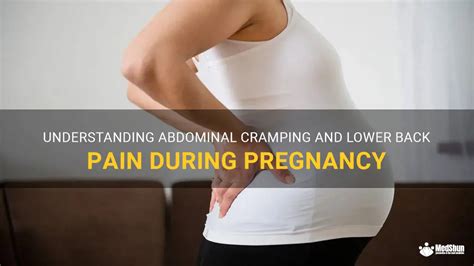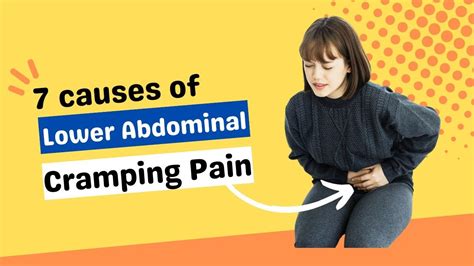Intro
Understand pregnancy lower abdominal cramping causes, symptoms, and relief methods, including mild cramps, sharp pains, and stomach discomfort during early pregnancy, miscarriage, and ectopic pregnancy, to ensure a healthy pregnancy journey.
Pregnancy is a life-changing experience that brings about numerous physical and emotional transformations. Among the various symptoms that women may encounter during this period, lower abdominal cramping is one of the most common and concerning. It is essential to understand the causes, symptoms, and implications of lower abdominal cramping during pregnancy to ensure a healthy and stress-free experience. Lower abdominal cramping can be a symptom of various conditions, and it is crucial to identify the underlying cause to provide appropriate care and management.
As the body undergoes significant changes to support the growing fetus, women may experience a range of sensations, from mild discomfort to severe pain. Lower abdominal cramping can be caused by implantation, miscarriage, ectopic pregnancy, or other factors such as constipation, gas, or urinary tract infections. In some cases, it may be a sign of a more serious condition, such as placenta previa or placental abruption. Understanding the possible causes of lower abdominal cramping is vital to provide timely and effective care.
The physical and emotional changes that occur during pregnancy can be overwhelming, and it is natural to feel anxious or concerned about any unusual symptoms. Lower abdominal cramping can be a source of significant distress, especially if it is severe or persistent. However, in many cases, it is a normal and harmless symptom that can be managed with rest, hydration, and other self-care measures. By educating themselves about the causes, symptoms, and management of lower abdominal cramping, women can reduce their anxiety and focus on maintaining a healthy pregnancy.
Understanding Lower Abdominal Cramping During Pregnancy

Lower abdominal cramping during pregnancy can be caused by various factors, including hormonal changes, implantation, and the growing uterus. As the embryo implants itself into the uterine lining, women may experience mild to moderate cramping, which can be accompanied by light bleeding or spotting. In some cases, the cramping may be severe and persistent, requiring medical attention. Understanding the underlying causes of lower abdominal cramping is essential to provide appropriate care and management.
Causes of Lower Abdominal Cramping
The causes of lower abdominal cramping during pregnancy can be categorized into two main groups: normal and abnormal. Normal causes include implantation, constipation, gas, and urinary tract infections, while abnormal causes include miscarriage, ectopic pregnancy, placenta previa, and placental abruption. It is essential to identify the underlying cause of lower abdominal cramping to provide timely and effective care.Normal Causes of Lower Abdominal Cramping

Normal causes of lower abdominal cramping during pregnancy include:
- Implantation: As the embryo implants itself into the uterine lining, women may experience mild to moderate cramping, which can be accompanied by light bleeding or spotting.
- Constipation: Hormonal changes during pregnancy can cause constipation, leading to lower abdominal cramping and discomfort.
- Gas: Gas and bloating are common symptoms during pregnancy, which can cause lower abdominal cramping and discomfort.
- Urinary tract infections: Urinary tract infections can cause lower abdominal cramping, burning sensation while urinating, and frequent urination.
Abnormal Causes of Lower Abdominal Cramping
Abnormal causes of lower abdominal cramping during pregnancy include:- Miscarriage: Lower abdominal cramping can be a sign of miscarriage, especially if it is severe and persistent.
- Ectopic pregnancy: An ectopic pregnancy can cause lower abdominal cramping, vaginal bleeding, and shoulder pain.
- Placenta previa: Placenta previa can cause lower abdominal cramping, vaginal bleeding, and premature labor.
- Placental abruption: Placental abruption can cause lower abdominal cramping, vaginal bleeding, and fetal distress.
Managing Lower Abdominal Cramping During Pregnancy

Managing lower abdominal cramping during pregnancy requires a comprehensive approach that includes self-care measures, medical care, and lifestyle modifications. Women can manage lower abdominal cramping by:
- Practicing relaxation techniques, such as deep breathing, meditation, and yoga.
- Engaging in regular exercise, such as walking, swimming, and prenatal yoga.
- Eating a balanced diet that includes plenty of fruits, vegetables, whole grains, and lean protein.
- Staying hydrated by drinking plenty of water and other fluids.
- Avoiding heavy lifting, bending, and strenuous activities.
- Getting plenty of rest and sleep.
Medical Care for Lower Abdominal Cramping
Medical care for lower abdominal cramping during pregnancy may include:- Pelvic exams to check for any abnormalities or infections.
- Ultrasound scans to check the fetal growth and development.
- Blood tests to check for any infections or hormonal imbalances.
- Medications to manage pain, inflammation, and infections.
Preventing Lower Abdominal Cramping During Pregnancy

Preventing lower abdominal cramping during pregnancy requires a proactive approach that includes lifestyle modifications, self-care measures, and medical care. Women can prevent lower abdominal cramping by:
- Maintaining a healthy weight and body mass index.
- Engaging in regular exercise, such as walking, swimming, and prenatal yoga.
- Eating a balanced diet that includes plenty of fruits, vegetables, whole grains, and lean protein.
- Staying hydrated by drinking plenty of water and other fluids.
- Avoiding heavy lifting, bending, and strenuous activities.
- Getting plenty of rest and sleep.
Lifestyle Modifications for Preventing Lower Abdominal Cramping
Lifestyle modifications for preventing lower abdominal cramping during pregnancy include:- Avoiding caffeine and other stimulants that can cause uterine contractions.
- Avoiding tobacco and other substances that can cause harm to the fetus.
- Managing stress and anxiety through relaxation techniques, such as deep breathing, meditation, and yoga.
- Getting regular prenatal care and check-ups to monitor the fetal growth and development.
What are the common causes of lower abdominal cramping during pregnancy?
+Common causes of lower abdominal cramping during pregnancy include implantation, constipation, gas, urinary tract infections, miscarriage, ectopic pregnancy, placenta previa, and placental abruption.
How can I manage lower abdominal cramping during pregnancy?
+Women can manage lower abdominal cramping by practicing relaxation techniques, engaging in regular exercise, eating a balanced diet, staying hydrated, avoiding heavy lifting and strenuous activities, and getting plenty of rest and sleep.
What are the signs of abnormal lower abdominal cramping during pregnancy?
+Signs of abnormal lower abdominal cramping during pregnancy include severe and persistent pain, vaginal bleeding, shoulder pain, and fetal distress. Women should seek medical attention immediately if they experience any of these symptoms.
In summary, lower abdominal cramping during pregnancy is a common symptom that can be caused by various factors, including hormonal changes, implantation, and the growing uterus. Understanding the underlying causes of lower abdominal cramping is essential to provide timely and effective care. Women can manage lower abdominal cramping by practicing relaxation techniques, engaging in regular exercise, eating a balanced diet, staying hydrated, avoiding heavy lifting and strenuous activities, and getting plenty of rest and sleep. By taking a proactive approach to managing lower abdominal cramping, women can reduce their anxiety and focus on maintaining a healthy pregnancy. We invite our readers to share their experiences and concerns about lower abdominal cramping during pregnancy in the comments section below. Additionally, we encourage our readers to share this article with their friends and family to raise awareness about the importance of prenatal care and management of lower abdominal cramping during pregnancy.
